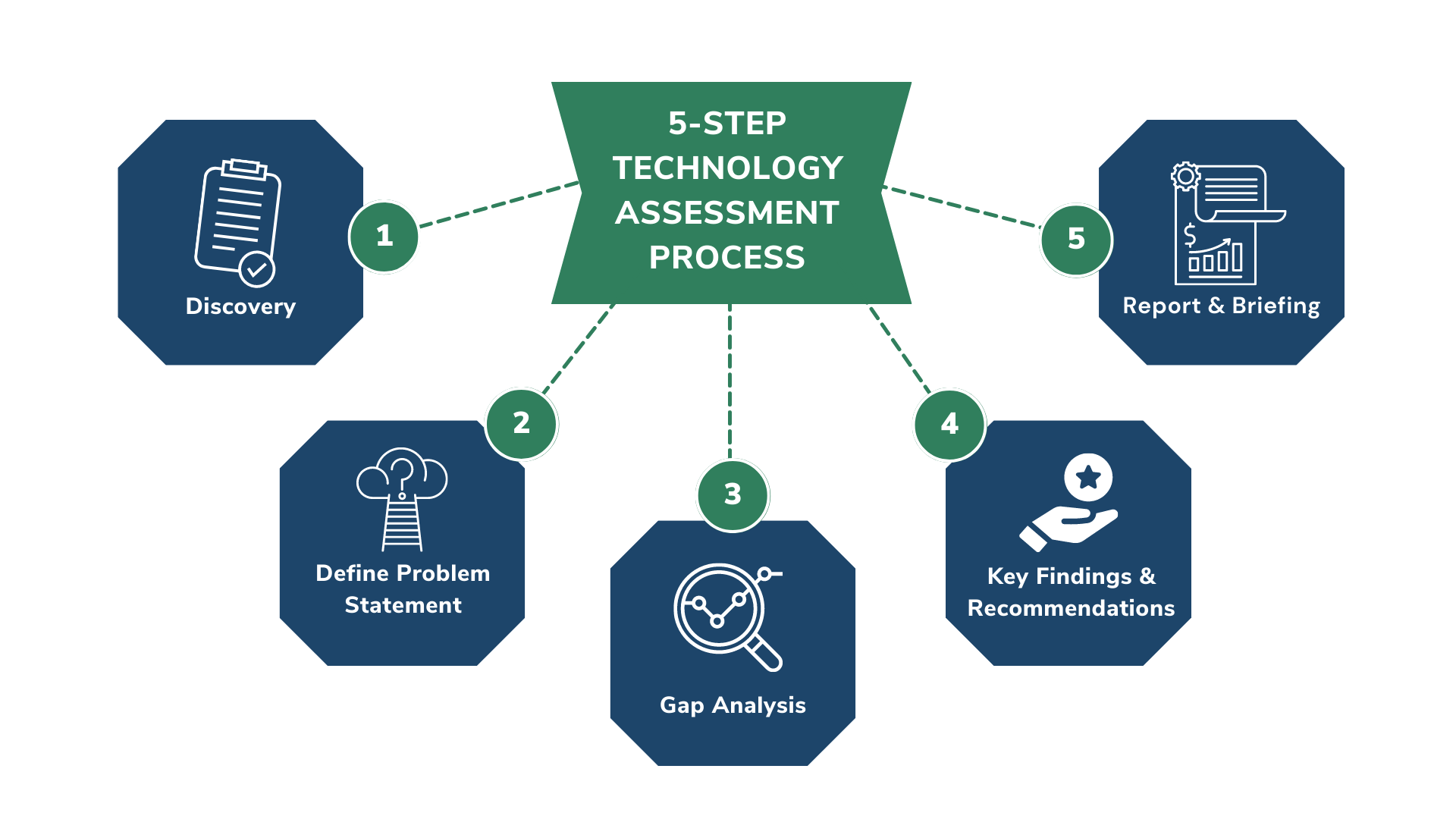Technology Assessment
Our expert-led assessment follows a 5-step process to report actionable steps.
As a leader, you know that scaling your business and fueling massive growth is a heroic leap for the entire company. Based on our 30 years of experience working with leading technology companies, we know that the most common roadblocks to achieving growth and profit goals are your technical debt, high technology costs, competing priorities, and lack of capacity to take on new products or features.
Go-to-market speed is critical to remaining competitive and relevant to customers, which is why an objective, unbiased and expert-led technology assessment can be the most important decision you’ll make to ensure you address technology gaps holding back your growth – from scaling architecture to product lifecycle to cloud strategy to new technology investment. It gives you a comprehensive summary of actionable next steps to produce more successful results and achieve your revenue goals.
Why is a Business Technology Assessment Important?
Conducting a technology assessment is an investment that businesses make to strategically evaluate core technologies, products, intellectual property, and more. If you’re looking to build confidence in your go-to-market plan, improve decision-making, achieve aggressive growth goals or obtain technical due diligence for investment or acquisition, there are a number of benefits to an independent report from Ten Mile Square’s experts.
- Fuel company growth: A strategic product plan ensures your technology is ready to scale to keep pace with your growth goals, avoid costly mistakes, and maintain high levels of customer satisfaction.
- Control costs: Total cost of ownership (TCO) for cloud-based or cloud-native applications are typically driven by product development. Our technology assessment gap analysis uncovers key ways to ensure the desired state is cost-effective and profitable.
- Mitigate risks: Our team clearly identifies and documents your risks including indicating the level of importance and recommending prioritized, actionable steps for mitigating or solving risks.
- Objective product life cycle reporting: We evaluate what is working and what needs to be improved with an external, unbiased perspective as part of the technology assessment.
- Foster continuous improvement culture: Our reports provide specific action items to optimize operational processes within teams and cross-functionally so they become ingrained as a part of your culture.
- Identify security issues: While most tech firms rarely request an assessment of security issues, our expert team always identifies potential security deficits when found and includes them in our report.
Our 5-Step Technical Assessment Process
The 5-step process to completing an expert-led technical assessment is highly structured. We’ll rapidly assess product platforms, product management, product development, product operations, client onboarding, and integration capabilities. Each assessment phase is customized to ensure we meet management’s goals when producing our findings and non-biased recommendations.

1. Discovery
Information Request
The assessment begins with an information request to provide a comprehensive set of documentation from key areas of the business. After successfully working on hundreds of assessments, we’ve seen this background is key for our team to gain a full understanding of your business goals, product goals, and current technology state. If any documentation isn’t available or current, the topic can be addressed in the in-depth interviews. Documentation requests for full transparency may include:
- Business plan and revenue projections
- Go-to-market strategy and marketing requirement documents
- Technology investment plan to achieve revenue productions
- Organizational chart and staffing plan
- Product roadmap, release schedule, and past release notes
- Product architecture diagrams
- Project management artifacts
- Business continuity plan
In-depth Interviews
During this phase, we’ll conduct a series of in-depth interviews with key stakeholders in leadership, decision makers, product management and development, and customer support to hear about their prioritized business and product goals, operations, and product delivery. We review key documentation with contributing teams during open Q&A sessions. A typical 2-3 day interview schedule will include topics such as:
- Company background, history, expertise, market, key business metrics, and organizational structure
- Product definition, product management, analytics, packaging, technical product research and development (R&D), and product demonstration
- Intellectual property, proprietary methods or algorithms, third-party technology licenses, and patents applied for or pending
- Client and partner services, integration lifecycle, technical requirements, certification, integration surprises, client payment/reconciliation, and managed services/production operations
- Software development organization, methodologies/SDLC, information technology (IT), deployment and support processes, tools, and environments
- Product technical architecture, software requirements, use cases, data dictionary/schema, product performance requirements vs. benchmarks, and software API documentation
2. Define Problem Statement
- Statement of the ideal desired state of the technology once a solution is implemented
- Description of the current state explaining pain points that are a barrier to the solution
- Outline the potential impact on the business or product if the problem isn’t solved or improved upon
- Initial suggestions of proposed improvements to overcome the problem
3. Gap Analysis
4. Key Findings & Recommendations
5. Report & Briefing
In this final step, you’ll receive a comprehensive report that can be used by management and decision-makers to implement the plan. We conduct a live debriefing meeting with all key stakeholders to explain the key insights, review recommendations, hear feedback, answer questions and discuss how the organization plans to make decisions to implement the recommendations moving forward. The report is finalized after the meeting to incorporate final input and implementation plan details. Schedule a discovery call today >
Ten Mile Square expert-led technology assessments can also transition into helping our clients implement recommendations in a number of areas, including architecture scalability issues, digital transformation, product management, cybersecurity, and strategic innovation.
What Should I Expect During a Technology Assessment?
When Ten Mile Square works with technology organizations, we take a collaborative approach so the key team members and management should be prepared to work transparently and trust sharing the true state of the business. To conduct a comprehensive assessment, Ten Mile Square needs to deeply understand your business goals and the current state of your technology. During the documentation and discovery phases, you can expect that our team of experts will ask a lot of probing questions about the documents and artifacts. We’re interested in your customer acquisition and retention model. We’ll also deep dive into understanding your capacity to invest in your future infrastructure growth.
The Most Common Findings in Our Technology Assessment Reports
- Current systems are manually maintained and a plan for investment is needed to implement automation
- Database architecture is not scalable to meet the needs of the product roadmap
- Development teams and processes are structured inefficiently
- There is a lack of business continuity and disaster recovery capabilities
Scaled B2B Fintech SaaS Company from $30M to $100M
- Identified several gaps, including aligning the engineering team’s priorities with business goals
- Led remediation by providing a fractional CTO, technical project manager, engineering manager, scrum master, and DevOps engineers
- Completely automated their delivery pipeline, value chain, and automated testing
- Hired full-time CTO with the expertise needed to continue the work we started
- Successfully scaled revenue 3x from $30M to $100M over 3 years
Featured Technology Assessment Articles

Who’s Really in Control of Total Cost of Ownership (TCO)
Today, if you are building and operating cloud-based or cloud-native applications, the concentration of the source for TCO comes from

Running Successful Technology Assessments
These days, almost every business relies on technology products and platforms to run daily operations and meet its goals. Unfortunately, your

The Seven Technology Pathologies that Can Sink Your Business and How to Fix Them
The pace of business change is not predictable. Technology systems and products must evolve rapidly enough to meet business demands
Technology Assessments We Provide
- Full-stack and full software development lifecycle
- Technical due diligence
- Product or software technology
- Cloud technology strategy
- AWS analysis
- Google Cloud Platform review
- Enterprise technology
- Source code review